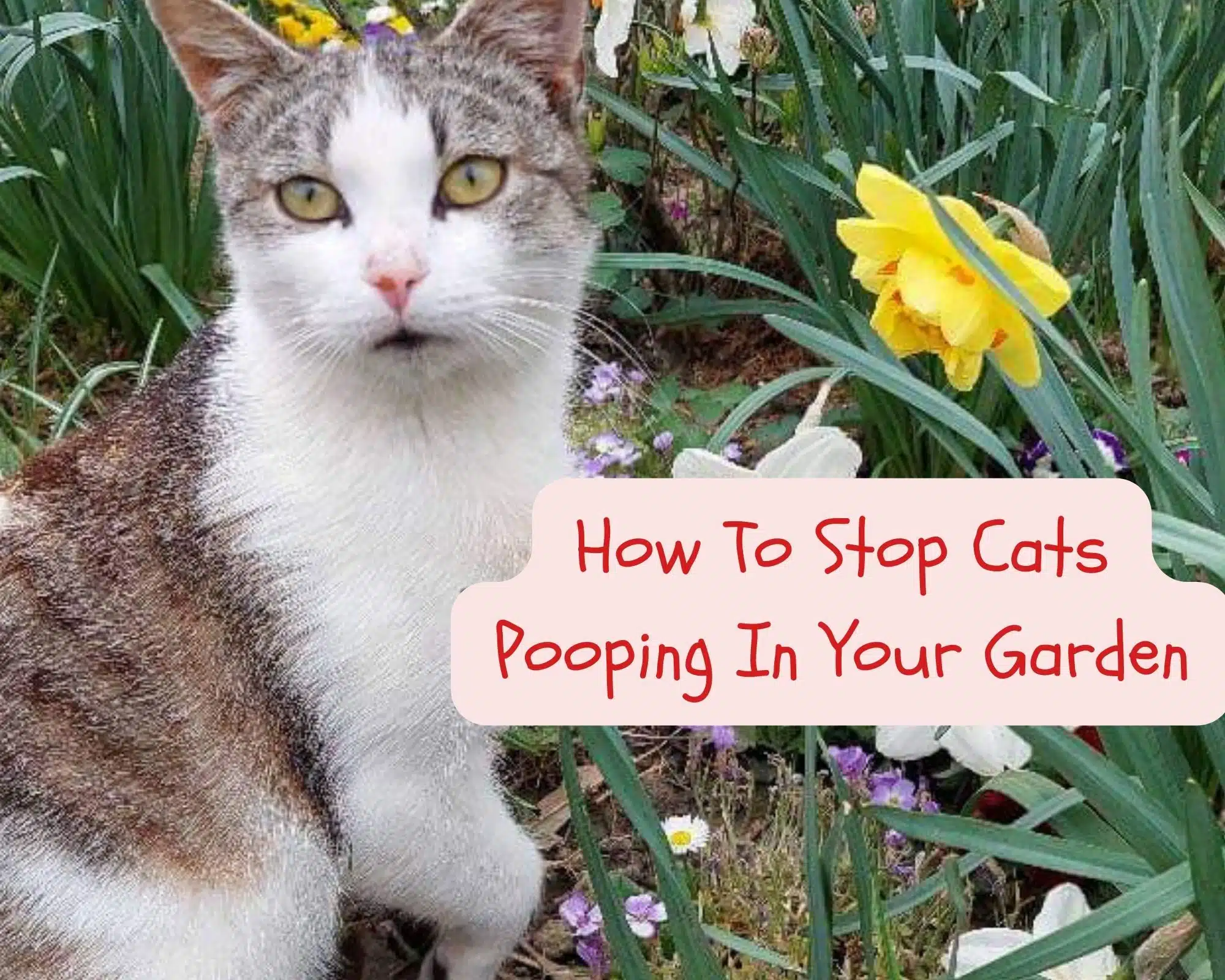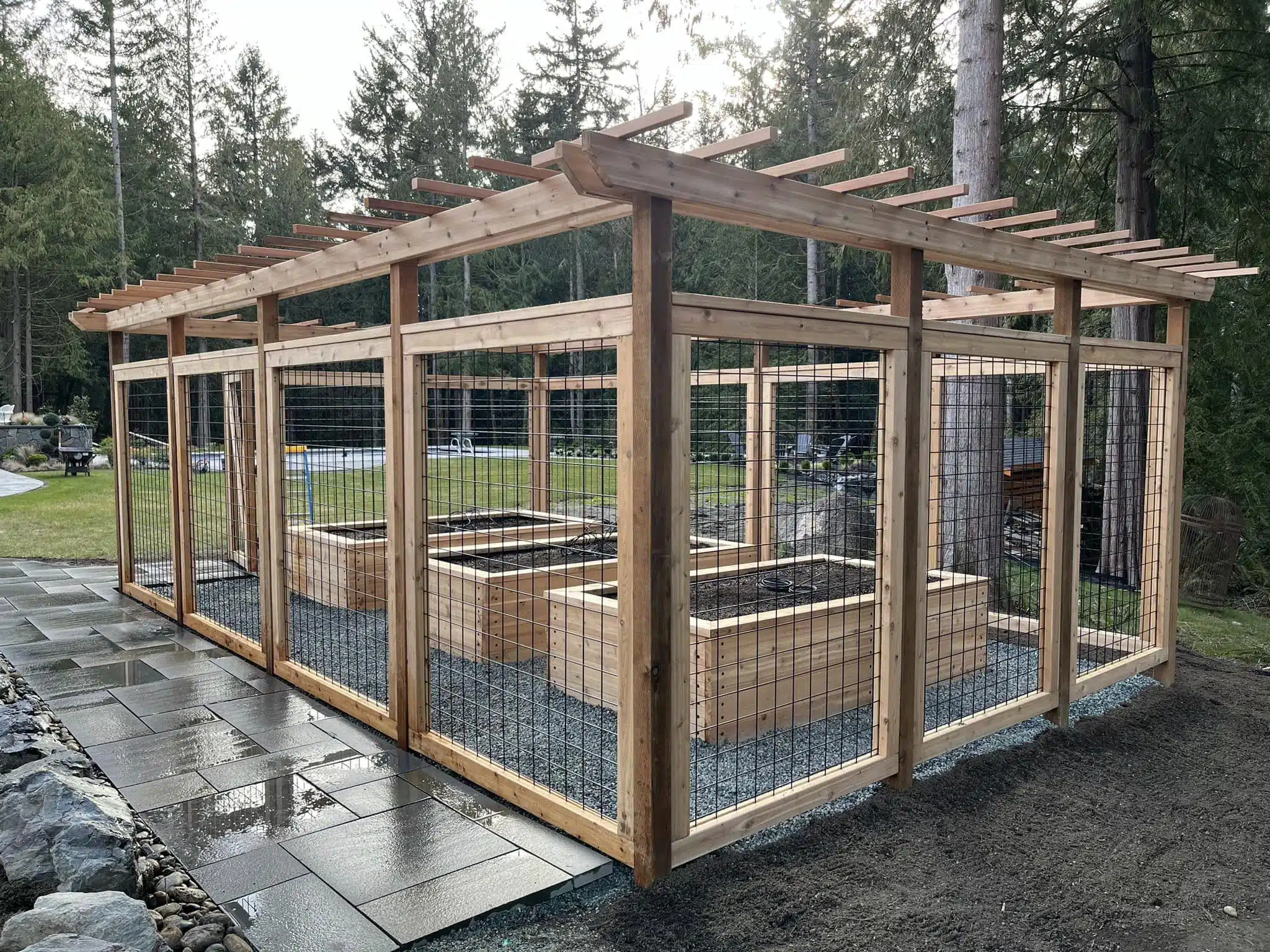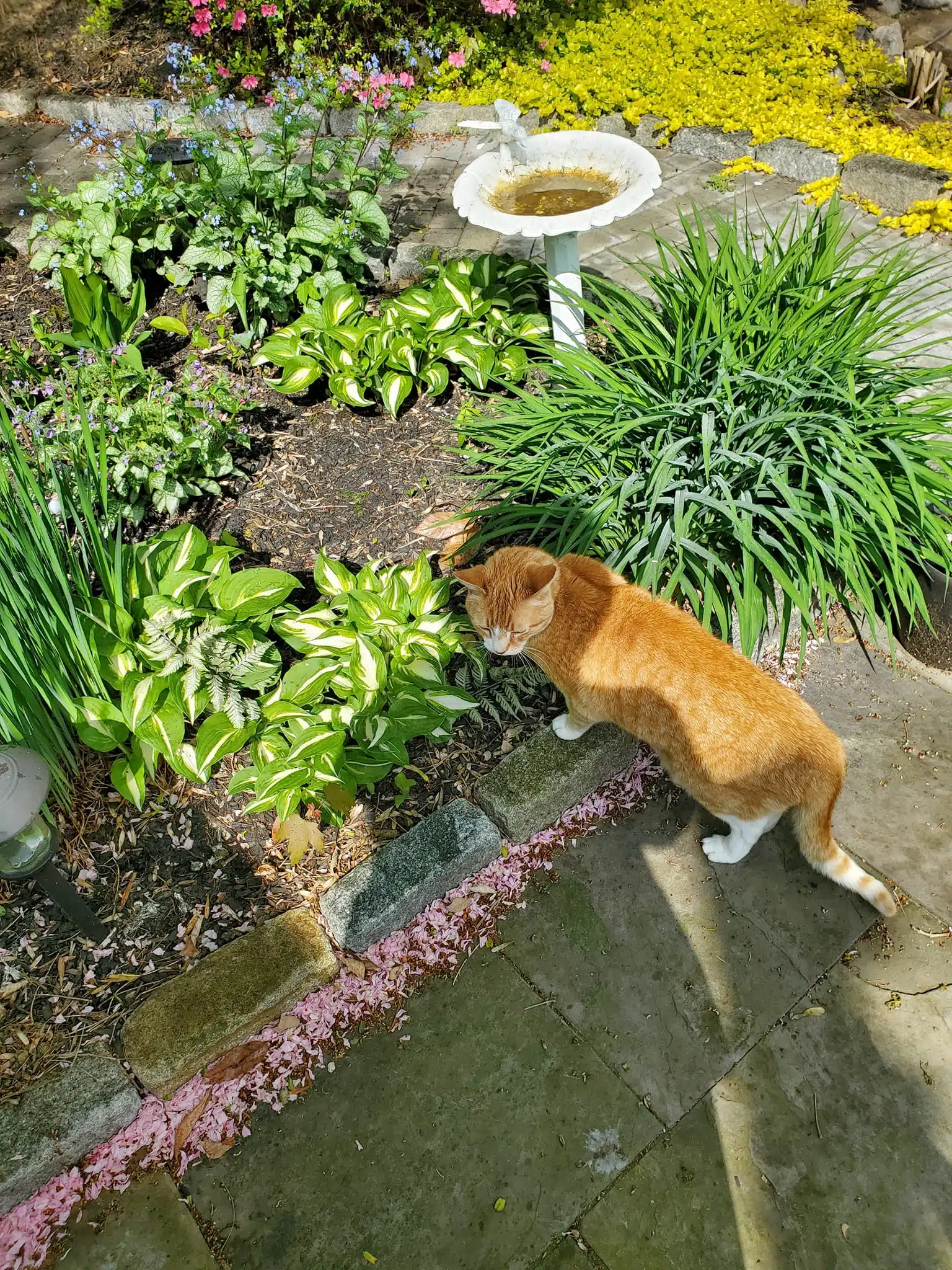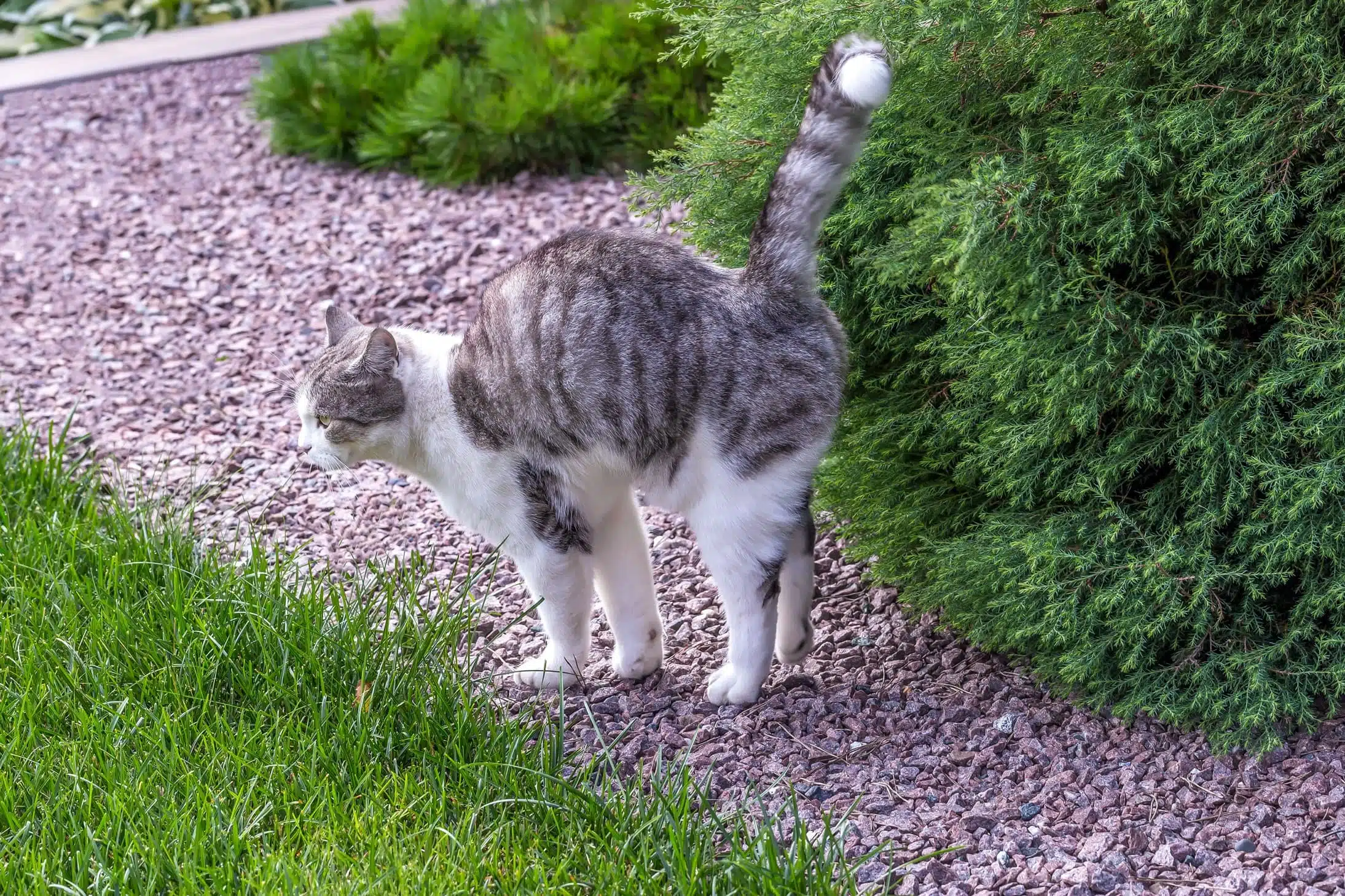To cats, your garden looks like a giant, inviting litterbox with soft, fresh soil, mulch, or sand they can use to relieve themselves. Cats are adorable little creatures who are naturally curious, playful, and sometimes mysterious and will enthusiastically use your garden as their playground and even litter box.
Cats, whether yours or the neighbors’, pooping in your garden means more cleaning duties for you and the introduction of pathogens harmful to plants and you. So, how do you stop this?
Below are many strategies you can enact to stop them from using your garden as their litter box.
How To Stop Cats Pooping In Your Garden
1. Clean Up Existing Cat Poop
Leaving cat poop in your garden will only invite more cats to poop there. So, scoop the poop, bag and seal it, and put it inside the garbage bin. After that, rinse the area to remove residue.
Do not pick cat poop with bare hands, even with gloves. Instead, use a scoop, trowel, or plastic bag.
2. Don’t Feed Them
Cats will come to your garden for two reasons- shelter or food. Take these away, and they won’t have a reason to come over. To that end, if you’ve been feeding stray or the neighbors’ cats, stop doing so. If you still wish to continue feeding stray cats, place the food far from your garden and immediately clean up the leftovers.
In addition, make sure cats don’t have access to birdseed, food waste, or pet food from your property. So, close your garbage cans and clean your home, removing anything cats can eat.
Note
Politely ask your neighbors to stop feeding stray cats.
Read More:
3. Set Up Physical Barriers
Turn your garden into a fortress using barriers. This makes it difficult for nosey cats to enter and ruin the place. Below are your options:
a) Chicken Wire Fence
This physical barrier looks like a standard fence but is taller (at least 6 feet) and slightly modified. For instance, the top section may have horizontal bars that spin when a cat tries to climb over.
Also, some designs have an additional piece at the top angled at around 45 degrees or lined with spikes. A chicken wire fence is made of wire mesh, clear panels, or even wood.
Note
If you already have a fence around your garden, you can cat-proof it by ensuring it’s the right height, filling any gaps, and installing a topper.
b) A Standard Fence
A standard fence can also keep cats out, provided it is high enough and made of robust materials. Chicken wire is a fantastic choice. Although cats can jump high, a chicken wire fence will keep them out if it’s high enough. Surround your garden or plants with this fence.
c) Natural Fence
This option is functional and aesthetically appealing. Surround your garden perimeter with a tall, thick hedge. Design this by mixing thorny plants such as roses, barberry, and hollies and dense shrubs like boxwood and privet.
Alternatively, weave live hazel or willow branches into a green, dense, effective barrier.
4. Make The Ground Uncomfortable For Cats
Cats are quite particular about where they walk; they avoid difficult or uncomfortable areas, such as rough surfaces. You can deter cats from lingering and pooping in your garden by altering the texture of the ground in your garden.
-
Lay Chicken Wire Under The Soil
After planting your garden, lay chicken wire just under the soil to keep cats from digging and pooping there. Most plants will easily grow through the chicken wire, but the texture of the wire will be uncomfortable for a cat’s paws.
-
Mulch Your Garden With Rough Materials
Rough materials make the ground uneven and coarse, so mulch your garden with pine cones, bark mulch, rough wood chips, eggshells, pebbles, or stone mulch.
-
Sticks
Crisscross tree branches across your garden or plant beds to make the area less inviting to cats.
-
Spike Mats
Don’t worry; spike mats don’t harm cats but are uncomfortable on their paws. Make your garden unappealing to cats by positioning spike mats in areas where cats tend to roam, such as pathways, near plants, or in garden beds.
5. Use Water
Despite spending much of the day grooming themselves, cats loathe water because it’s exceptionally uncomfortable on their fur. Therefore, these animals will avoid areas where they could get splashed or sprayed with water.
a) Garden Hose
If you spot a cat in your garden, spray water in their direction to startle and chase them away. However, don’t spray them directly because it can be dangerous. Spray your garden regularly to keep the soil moist (cats hate it), and reiterate to the cats that your garden isn’t a place for them.
b) Motion-Activated Sprinklers
Motion activated sprinklers are convenient and highly effective. When the sensor detects a cat entering your garden, it gets triggered, thus releasing a burst of water. Place these devices where you’ve witnessed cat activity or around your garden perimeter.
5. Use Sound
Cats will avoid a place if they hear unfamiliar or unpleasant sounds because they are sensitive to noise. Use the following devices:
-
Ultrasonic Devices
The sound these devices emit is inaudible to humans but quite unpleasant to cats.
-
Motion-Activated Sound Alarms
When these devices detect motion, they emit loud, sudden noises such as sirens, alarms, or high-pitched tones. While effective, the loud noises these alarms produce can be annoying.
-
Wind Chimes
Hang wind chimes at your garden’s entry points or near plant beds. The cats will find the wind chimes’ gentle clinking and tinkling unsettling.
6. Scent Deterrents
Cats have a powerful sense of smell, which they use to detect food, identify other animals, and navigate their environment. They avoid areas with smells they find unpleasant or strong. What are these smells, though?
-
Citrus
The smell of citrus is repugnant to cats. So, repel these animals with lemon, lime, or orange peels. You could also spray citrus essential oil around the garden.
-
Coffee Grounds
Reserve used coffee grounds and spread them around the garden. Besides repelling cats, they will also fertilize the soil. However, don’t use too much to avoid altering the soil pH.
-
Spray Vinegar
Apply a mixture of water and vinegar (ratio of 2:1) where you don’t want cats pooping. Do this once a week.
-
Garlic and Onion
Even cats aren’t immune to the onions’ eye-watering effects. Moreover, the pungent smell of onions, as well as garlic, deters them. Chop or crush garlic or onions and scatter them in your garden.
-
Bananas
Another to stop cats from pooping in your garden is scattering chopped banana peels there.
-
Essential Oils
Peppermint, tea tree oil, eucalyptus, and citronella essential oils emit strong smells cats dislike.
-
Herbs and Spices
Plant herbs like mint, rosemary, coleus canina, lemongrass, and lavender, and sprinkle spices like cinnamon, cayenne pepper, or black pepper around your garden. Dried herbs or their essential oils also work.
-
Commercial Cat Repellents
Buying cat repellents is also an option. Get a product designed for outdoor use and safe for the cats and your garden.
7. Designate An Area For Cats In Your Garden
If you don’t mind having cats in your garden, why not provide them with an area where they can freely play, dig, and even poop? A cat-friendly zone will help reduce their interest in the rest of your garden, thus lowering the chances of them pooping there or ruining your plants.
Choose The Right Location
Cats gravitate towards safe areas where they can easily observe the surroundings. Choose a sheltered, quiet, low-traffic location in your garden. Also, a sunny location is ideal because cats like basking in the sun.
Moreover, for the sake of your plants, pick an area away from your garden beds.
Make The Place Cat-Friendly
Spread soft sand or loose dirt in this area for the cats to dig and use as a litterbox. In addition, install scratching posts and climbing structures. Cats will also appreciate a place to hide or nap.
Making this area comfortable and safe for cats may not be enough to lure them here, so what can you do to make it attractive? Here are some ideas:
- Leave a few interactive cat toys or treats in the area
- Plant catnip. Cats are naturally attracted to its scent, so they are more likely to spend time in an area where this plant is growing
- Clean this place regularly to keep it enticing
8. Plant Your Garden Densely
Planting your garden densely leaves cats with little room to move around freely, let alone dig or poop. The dense foliage of groundcovers and bushy, low-growing shrubs will discourage cats from walking in your garden.
On the other hand, thick hedges create visual and physical barriers that cats will find difficult to cross. You should also fill the gaps between plants with other plants, mulch, or ground covers.
Wrap Up
Persistence and patience are mandatory if you hope to completely stop cats from pooping in your garden. These adorable animals are creatures of habit and often use their feces to make their territory. Once they choose a spot, they frequently return to mark it. Therefore, your efforts to keep them away may take time. You will yield better results by combining various strategies.

Hey there, fellow plant enthusiasts! I’m Rachel, the green-thumbed writer behind Rooted In Garden. With a deep-rooted love for all things botanical, I’ve made it my mission to help you cultivate a thriving collection of houseplants. As a devoted plant parent myself, I understand the joys and challenges that come with nurturing these leafy wonders. Whether you’re a succulent aficionado, an orchid enthusiast, or simply adore all potted flora, join me on this journey as we explore the secrets to growing and caring for our beloved green companions. Together, let’s create a flourishing oasis indoors.




